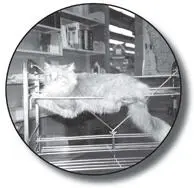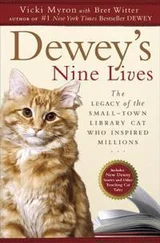DEWEY’S JOB DESCRIPTION
Written in response to the question, “So what is Dewey’s job?” which was often asked after people found out Dewey received a 15 percent library employee discount from Dr. Esterly.
1.Reducing stress for all humans who pay attention to him.
2.Sitting by the front door every morning at nine to greet the public as they enter the library.
3.Sampling all boxes that enter the library for security problems and comfort level.
4.Attending all meetings in the Round Room as official library ambassador.
5.Providing comic relief for staff and visitors.
6.Climbing in book bags and briefcases while patrons are studying or trying to retrieve needed papers.
7.Generating free national and worldwide publicity for Spencer Public Library. (This entails sitting still for photographs, smiling for the camera, and generally being cute.)
8.Working toward status as world’s most finicky cat by refusing all but the most expensive, delectable foods.
Chapter 21
What Makes Us Special?

I’ll always remember the former city manager. Every time he saw me, he said with a smile, “Are you girls at the library still mooning over that cat?” Maybe he was trying to be funny, but I couldn’t help but feel offended. Girls! That word might be a term of endearment, but I got the feeling he was putting me in my place, that he was speaking for a large block of community leaders who couldn’t even conceive of making a fuss over things like books, libraries, and cats. That was girl stuff.
Did the town even need a cat anymore? It was the twenty-first century, after all, and Spencer was thriving. In the late 1990s, the YMCA completed a $2 million renovation. The Spencer Regional Hospital expanded twice. Thanks to $170,000 in donations and 250 volunteers, the modest new playground planned for East Lynch Park turned into a 30,000-square-foot megaplayground called the Miracle on South Fourth Street. Why not just take the next step and attract . . . a casino?
When Iowa decided to issue a few casino licenses in 2003, some community leaders sensed an opportunity to catapult Spencer into the biggest little small town in America. They courted developers, even picked out a location along the river on the southwest edge of town, and drew up plans. But for many of us, the casino in 2003 looked like the slaughterhouse in 1993—a chance to put on economic muscle, but at a high cost. Sure, the casino would generate good jobs and, according to estimates, more than a million dollars in mandatory charitable contributions a year, but would we ever be the same town again? Would we lose our identity and become, in our own eyes and everyone else’s around, the casino town? The debate went back and forth, but in the end the casino met the same fate as the Montfort plant: the community voted it down. The casino was authorized in Palo Alto County, the county east of us, and built in Emmetsburg, only twenty-five miles away.
Maybe when we voted down the casino we once again turned our backs on the future. Maybe we were selling out our history as a progressive town. Maybe we were being naive. But in Spencer we believe in building on what we have.
We have the Clay County Fair, one of the best county fairs in the United States and a tradition for almost a hundred years. Clay County has fewer than 20,000 residents, but the fair attracts more than 300,000 people for nine days of rides, concerts, food, and fun. We have a full-size track for races and tractor pulls, a separate ring for horses, and long metal barns for everything from chickens to llamas. There are hay wagons to take you from the parking lot (a grass field) to the front gate. We’ve even installed a sky bucket system to carry people from one end of the fair to the other. There’s a year-round sign about ten miles south of Spencer, on the main road (and only road if you’re driving more than a few miles), that counts down the weeks to the fair. It’s painted on a brick building built on the highest hill in the area.
We have Grand Avenue, a historic treasure, rebuilt in 1931 and revived in 1987. In the late 1990s, our city planner, Kirby Schmidt, spent two years researching our downtown strip. Kirby was one of the native sons who almost left Spencer during the crisis of the 1980s. His brother left for the East Coast, his sister for the West Coast. Kirby sat down at the kitchen table with his young family, and they decided to stick it out. The economy turned; Kirby got a job with the city. A few years later, I gave him the key to the library, and he started coming in at six every morning to search through microfiche files, old newspapers, and local histories. Dewey mostly slept through these early visits; in the morning, he only had eyes for me.
In 1999, Grand Avenue between Third Street and Eighth Street was placed on the National Register of Historic Places. The area was cited as a remarkable example of Prairie Deco and one of the few surviving comprehensive models of Depression-era urban planning. It usually took two or three applications to make the Registry, but thanks to Kirby Schmidt, Grand Avenue made it by unanimous vote on the first application. Around the same time, Kirby’s sister moved her family back to Spencer from Seattle. She wanted to raise her kids the old-fashioned way: in Iowa.
That’s another of Spencer’s unique and valuable assets: its people. We are good, solid, hardworking midwesterners. We are proud but humble. We don’t brag. We believe your worth is measured by the respect of your neighbors, and there is no place we’d rather be than with those neighbors right here in Spencer, Iowa. We are woven not just into this land, which our families have worked for generations, but to one another. And a bright shining thread, popping up in a hundred places in that tapestry, is Dewey.
In our society, people believe you have to do something to be recognized, by which we mean something “in your face,” and preferably caught on camera. We expect a famous town to survive a tsunami and a forest fire or produce a president or cover up some horrible crime. We expect a famous cat to save a child from a burning building, find his way home after being left behind on the other side of the country, or meow “The Star-Spangled Banner.” And that cat better be not just heroic and talented, but media savvy, attractive, and have a good press agent, too, or he’s never going to make it onto the Today show .
Dewey wasn’t like that. He didn’t perform spectacular feats. There was nobody pushing him to success. We didn’t want him to be anything more than the beloved library cat of Spencer, Iowa. And that’s all he wanted, too. He ran away only once, and he went only two blocks, and even that was too far.
Dewey wasn’t special because he did something extraordinary but because he was extraordinary. He was like one of those seemingly ordinary people who, once you get to know them, stand out from the crowd. They are the ones who never miss a day of work, who never complain, who never ask for more than their share. They are those rare librarians, car salesmen, and waitresses who provide excellent service on principle, who go beyond the job because they have a passion for the job. They know what they are meant to do in life, and they do it exceptionally well. Some win awards; some make a lot of money; most are taken for granted. The store clerks. The bank tellers. The auto mechanics. The mothers. The world tends to recognize the unique and the loud, the rich and the self-serving, not those who do ordinary things extraordinarily well. Dewey came from humble beginnings (an Iowa alley); he survived tragedy (a freezing drop box); he found his place (a small-town library). Maybe that’s the answer. He found his place. His passion, his purpose, was to make that place, no matter how small and out of the way it may have seemed, a better place for everyone.
Читать дальше













